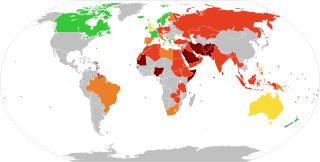Related Research Articles
Religious intolerance is intolerance of another's religious beliefs, practices, faith or lack thereof.
Blasphemy, as defined in some religions or religion-based laws, is an insult that shows contempt, disrespect or lack of reverence concerning a deity, an object considered sacred or something considered inviolable. Some religions regard blasphemy as a religious crime, including insulting the Islamic prophet Muhammad in Islam, speaking the "sacred name" in Judaism, and the "eternal sin" in Christianity.
Religious persecution is the systematic mistreatment of an individual or a group of individuals as a response to their religious beliefs or affiliations or their lack thereof. The tendency of societies or groups within societies to alienate or repress different subcultures is a recurrent theme in human history. Moreover, because a person's religion frequently determines his or her sense of morality, worldview, self-image, attitudes towards others, and overall personal identity to a significant extent, religious differences can be significant cultural, personal, and social factors.

Freedom of religion in Pakistan is guaranteed by the Constitution of Pakistan for individuals of various religions and religious sects.
Religious discrimination is treating a person or group differently because of the particular beliefs which they hold about a religion. This includes instances when adherents of different religions, denominations or non-religions are treated unequally due to their particular beliefs, either by the law or in institutional settings, such as employment or housing.

Buddhism is the second largest religion in Malaysia, after Islam, with 18.7% of Malaysia's population being Buddhist, although some estimates put that figure at 21.6% when combining estimates of numbers of Buddhists with figures for adherents of Chinese religions which incorporate elements of Buddhism. Buddhism in Malaysia is mainly practised by the ethnic Malaysian Chinese, but there are also Malaysian Siamese, Malaysian Sri Lankans and Burmese in Malaysia that practice Buddhism such as Ananda Krishnan and K. Sri Dhammananda and a sizeable population of Malaysian Indians.
Hindus have experienced both historical and ongoing religious persecution and systematic violence, in the form of forced conversions, documented massacres, genocides, demolition and desecration of temples, as well as the destruction of educational centres.
Pakistan has five major ethno-regional communities in Pakistan: Baloch, Muhajir, Punjabis, Pushtuns and Sindhis, as well as several smaller groups. There are also religious and sectarian groups such as Ahmadis, Christians, Hindus, Kalasha, Parsis and Sikhs, and Shia Muslim sects including Ismailis and Bohras.

The situation of Human Rights in Pakistan is complex as a result of the country's diversity, large population, its status as a developing country and a sovereign Islamic democracy with a mixture of both Islamic and secular law.

The Pakistan Penal Code penalizes blasphemy against any recognized religion. Penalties provided range from a fine to death. It is the main criminal code of Pakistan. According to human rights groups, blasphemy laws in Pakistan have been exploited for persecuting minorities, and for settling personal rivalries - often against other Muslims and not as much for protecting religious sensibilities.

Several different religions are practised in Indonesia. Indonesia is officially a presidential republic and a unitary state without an established state religion. Indonesia has the world's largest Muslim population and the first principle of Indonesia's philosophical foundation, Pancasila, requires its citizens to state the belief in "the one and almighty God". Although, as explained by the Constitutional Court, this first sila of Pancasila is an explicit recognition of divine substances and meant as a principle on how to live together in a religiously diverse society. However, blasphemy is a punishable offence and the Indonesian government has a discriminatory attitude towards its numerous tribal religions, atheist and agnostic citizens. In addition, the Aceh province officially applies Sharia law and is notorious for its discriminatory practices towards religious and sexual minorities. There are also Islamic fundamentalist movements in several parts of the country with overwhelming Muslim majorities.

In Islam, blasphemy is impious utterance or action concerning God, but is broader than in normal English usage, including not only the mocking or vilifying of attributes of Islam but denying any of the fundamental beliefs of the religion. Examples include denying that the Quran was divinely revealed, the Prophethood of one of the Islamic prophets, insulting an angel, or maintaining God had a son.
Sectarian violence in Pakistan refers to violence directed against people and places in Pakistan motivated by antagonism toward the target's religious sect. As many as 4,000 Shia are estimated to have been killed in sectarian attacks in Pakistan between 1987 and 2007, and thousands more Shia have been killed by Sunni extremists from 2008 to 2014, according to Human Rights Watch (HRW). Sunni Deobandis and Barelvis have also suffered from some sectarian violence, with attacks on religious shrines killing hundreds of worshippers, and some Deobandi leaders assassinated. Pakistan minority religious groups, including Hindus, Ahmadis, and Christians, have "faced unprecedented insecurity and persecution" in at least two recent years, according to Human Rights Watch. One significant aspect of the attacks in Pakistan is that militants often target their victims places of worship during prayers or religious services in order to maximize fatalities and to "emphasize the religious dimensions of their attack".

Christianity is the dominant religion in Belize. The single largest denomination is the Catholic Church with about 40.1% of the population, a reduction from 49.6% of the population in 2000, 57.7% in 1991 and 61.9% in 1980, although absolute numbers have still risen. Other major groups include Pentecostal with 8.4% of the population up from 7.4% in 2000 and 6.3% in 1991, Seventh-day Adventists with 5.4% of the population up from 5.2% in 2000 and 4.1% in 1991. The following of the Anglican Church has been steadily declining, with only 4.7% of the population in 2010 compared to 6.95% in 1991. About 12,000 Mennonites live mostly in the rural districts of Cayo and Orange Walk. People who declared they belong to no religion make up 15.5% of the population in 2010, more than double their 2000 census numbers. 11.2% adhere to other religions which include the Maya religion, Afro-Caribbean religions, Mormons, Hindus, Buddhists, Muslims, Baháʼís, Rastafarians and others.

Sardarji jokes or Sardar jokes are a class of ethnic jokes based on stereotypes of Sikhs. Although jokes about other ethnic and linguistic communities are found in various regions of India, Sardarji jokes are the most widely circulated ethnic jokes and found across the country. Sardarji jokes are generally considered tasteless and inappropriate by members of the Sikh community, and have elicited protests as well as leading to arrests for hurting religious sentiments.

Interactions between Muslims and Hindus began in the 7th century, after the advent of the former in the Arabian Peninsula. These interactions were mainly by trade throughout the Indian Ocean. Historically, these interactions formed contrasting patterns in northern and southern India. While there is a history of conquest and domination in the north, Hindu-Muslim relations in Kerala and Tamil Nadu have been peaceful. However, historical evidence has shown that violence had existed by the year 1700 A.D.

A blasphemy law is a law prohibiting blasphemy, which is the act of insulting or showing contempt or lack of reverence to a deity, or sacred objects, or toward something considered sacred or inviolable. According to Pew Research Center, about a quarter of the world's countries and territories (26%) had anti-blasphemy laws or policies as of 2014.
Blasphemy is not a criminal offence under Australian federal law, but the de jure situation varies at state and territory level; it is currently not enforced in any Australian jurisdiction. The offences of blasphemy and blasphemous libel in English common law were carried over to the Australian colonies and "received" into state law following Federation in 1901. The common-law offences have been abolished totally in Queensland and Western Australia, when those jurisdictions adopted criminal codes that superseded the common law. In South Australia, Victoria, and the Northern Territory the situation is ambiguous, as the local criminal codes do not mention blasphemy but also did not specifically abolish the common-law offences. In New South Wales and Tasmania, the criminal codes do include an offence of blasphemy or blasphemous libel, but the relevant sections are not enforced and generally regarded as obsolete.
The publishing of any "blasphemous libel" was a crime in New Zealand under Section 123 of the Crimes Act 1961 which allowed for imprisonment for up to one year. However, Section 123 protected all publications and opinions on any religious subject expressed in good faith and decent language against prosecution and specified that prosecution may proceed only with the leave of the attorney-general.
Religious discrimination in Pakistan is a serious issue for the human rights situation in modern-day Pakistan. Hindus, Christians, Sikhs, Shias, and Ahmadis among other religious minorities often face discrimination and at times are even subjected to violence. In some cases Christian churches and the worshippers themselves have been attacked. Khawaja Nazimuddin, the 2nd Prime Minister of Pakistan, stated: "I do not agree that religion is a private affair of the individual nor do I agree that in an Islamic state every citizen has identical rights, no matter what his caste, creed or faith be".
References
- ↑ Singh, Awadhesh (2014). Timeless Jokes - Ageless Wisdom. Allahbad: The Aatmic Science Foundation. ISBN 978-81-925300-6-2.